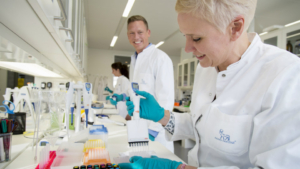
A promising transition to Horizon 2020 for SMEs
The end of the FP7 process has been a busy one, with a rush to grab the last EC funds before we all get thirsty in the break between FP7 and the launch of Horizon 2020 in 2014.
And my, hasn’t it been a busy time for all you clever SMEs out there! The results are in for the part of the Health call targeting SMEs (Innovation 2), with proposals requiring 50% of funding going to SMEs. There were two main topics in the call: the first on anti-infective research and the second in translating work from previous framework projects.
The EC has put its money where its mouth is for SMEs, which is great to see, with a140m available for the call. As well as targeting funding to SMEs, it has also made great strides in bringing a business focus to evaluation, with 72% of the evaluators coming from companies.
And the results? Pretty good. 58% of all that lovely money went to SMEs, with Germany, UK, France and the Netherlands taking the four top spots (Italy used to be right up there, I recall from my distant youth, but is looking a little sorry for itself these days). The average pass rate is about 40% for the UK, France and Netherlands, which is pretty good, while Germany has gone for a ‘pile ’em high and sell ’em cheap’ approach, with loads of proposals but a pass rate of just 25%.
A nice fact is that the targeted time from deadline to contract signature is to be just five months. DG Research & Industry has worked to respond to critics on access for SMEs and slow time scales, and this should be remembered when you next moan about EC funding. We’re still waiting for the results of the main programme in health – which had 35 topics and a679m to spend – but there’s plenty to take home from this first result.
Europe knows that it has to monetise its innovative research. The fact that we have stopped buying cars and other stuff made in factories in Europe has turned slick political phrases about innovation into urgent reality. We need the money back from research, and we need it now.
It’s fantastic to see that the largest funding programme in Europe is doing just that; money is being channelled to SMEs, the translators of research from a dream to commercial reality. While the market in Europe won’t fund earlystage commercial work (you idiots), governments and the EC are stepping into the gap. It’s also a relief to see funding of translational work from previous Framework projects. Funding a single part of the value chain will rarely push a product to market, but sustained funding on evidence-based progress is sensible and a good use of money, and it also strengthens productive partnerships that keep their eye on the market. FP7 has evolved over its lifetime, and the early signs from Horizon 2020 indicate that the focus on turning technologies into economic returns will continue. Keep up the good work, girls and boys of DG Research & Industry, and we look forward to enjoying the fruits of the Framework tree!




 Beiersdorf
Beiersdorf